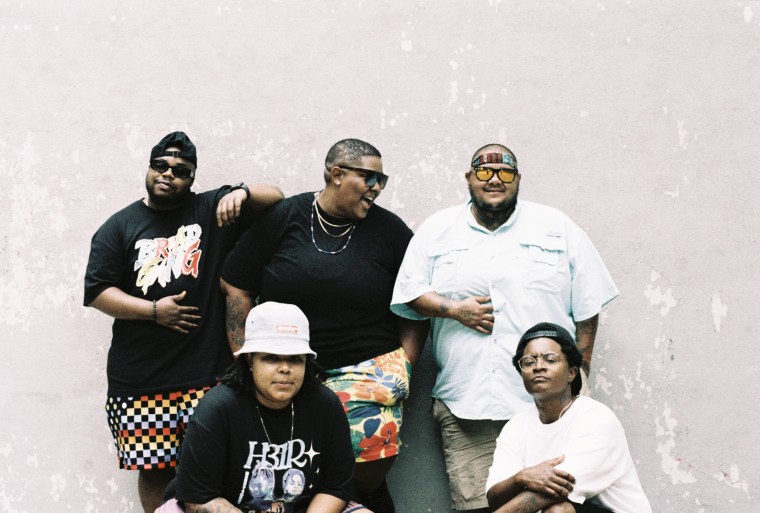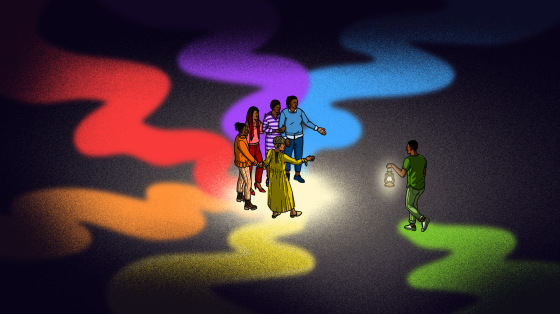For years, Morgan Mann Willis dreamed of having a community where it would be safe to openly talk about queer identity, explore sexual desires and be supported by others. That sense of belonging wasn’t something Willis, who uses she and they pronouns, had with their family of birth, in which there was a “really big gap of feeling like a whole person.”
“I don’t think that my family was ever going to be a place where I was going to think about the fullness of who I am or my identity or what my needs were,” Willis said.
So Willis, 38, created their own family. More than a decade ago, they joined bklyn boihood, a Black queer party and event collective that operates in cities across the U.S, to connect with LGBTQ people who identified on the masculine gender spectrum.
“Being a part of it has meant being able to dream beyond the boundaries of gender, of sexuality, of identity, and give us room to kind of fully bloom into whoever we are,” said Willis, who now lives in Detroit. “One of the ties that binds us is kind of the way that our masculinity is presented and maybe isn’t presented or lives in the world.”

Being part of the group was one of the first times, Willis said, they had a place to openly discuss queer sex and relationship traumas and to celebrate their milestones. When Willis performed at a queer storytelling event, they said, they almost cried when they saw the group cheering them on from the crowd.
“I’ve never had anyone show up and not have to formally invite them or beg them to come,” Willis said. “That was really special.”
Through the collective, Willis said, they were able to re-imagine what family looks like.
While coming out has become more accepted in recent years, many LGBTQ people, like Willis, are building their own “chosen” family trees in the face of rejection from their biological ones. In such chosen families — also known as found families — friends or groups act as stand-in parents for those who have been rejected or have difficult relationships with their families of origin. Forty-nine percent of Black LGBTQ adults say they have strained relationships with their parents, according to a 2021 UCLA report, compared to 33 percent of their straight Black peers.
History of Black chosen families
E. Patrick Johnson, the author of “Sweet Tea: Black Gay Men of the South” and the dean of the School of Communication at Northwestern University, said chosen families have long existed in the Black community.
“The history between Black queer chosen families is actually connected to the history of chosen families within Black communities in general,” Johnson said, “because of the long history of displaced families among Black folks who were enslaved for 100 years and broken and removed from their biological families and so out of necessity had to depend on each other.”
Johnson said it’s common within the Black community for children to refer to someone as their “play auntie” or “play uncle,” terms used to describe close family friends. Similar language developed in Black queer communities to label those bonds, he said.
“We would say when I was younger: ‘Is she family? Is he family?’ And that meant ‘Is this person gay?’” Johnson said. “It had nothing to do with being biologically related but sharing an identity.”
Black chosen families form bonds not only to escape homophobic families but also to find pleasure and communion with others, Johnson said. One example, he said, are house parties, which since the 1900s have been safe spaces for Black queer people to express their sexuality and make connections.
“It’s a place where folks can come and party or they come to have sex, where they come to be seen in the fullness of who they are,” he said.
The height of the HIV/AIDS epidemic also led to the formation of queer chosen families in the Black community, said Rin Reczek, the co-author of “Families We Keep: LGBTQ People and Their Enduring Bonds with Parents.”
“Chosen families were seen as particularly instrumental during the HIV/AIDS epidemic of the 1980s, when families and society writ large wholly rejected queer people,” Reczek said. “But they have remained a fixture of queer life today because they provide an environment free of homophobic and transphobic families of origin that are often rife with toxic expectations and interactions.”
‘It saved my life’
A chosen family often plays a larger role in an LGBTQ person’s life, said Sean Ebony Coleman, 53, a Black transgender man who is the founder of Destination Tomorrow, an LGBTQ organization in the Bronx, New York.
“A lot of times the chosen family has more sway or more influence,” said Coleman, who is part of the ballroom community and a longtime member of the House of Ebony. “When you look at the house and ballroom community, those young people come into that world and they have the love of the house mother, the house father, the house godparents, and these people become so influential that at times we can reach out to them if we’re having difficulties or we’re trying to get a message across to our clients.”
In ballroom culture, houses often provide members with food, shelter and mentorship in exchange for participation in ballroom competitions. In such spaces, LGBTQ people gather to dance and perform for prizes. Coleman has walked in ballroom categories such as “realness” in front of panels of judges and hundreds of spectators. He said the ballroom community not only helped him build confidence but also was a space that affirmed his LGBTQ identity.
“It saved my life,” Coleman said. “It was a place of safety that I could explore who I was without having to feel guilty about it or shame or ostracized. … I was amongst other folks who understood what it was that I was going through, and they became my brothers and sisters.”
Ciora Thomas, a Black transgender woman, ran away from home at 14 to escape a transphobic household. As the eldest child, she was expected to take on the role of a provider, but she said the responsibilities came to a halt when she started transitioning.
“I lost authority as an older sibling,” said Thomas, 33. “My brothers were being nasty to me. My mom was being nasty to me. The church was being nasty to me.”
LGBTQ people who lack family support are more at risk of homelessness and mental health issues, including depression and suicidal ideation, compared to people who are accepted, a 2016 report in the Journal of Adolescent Health found.
Thomas’ tumultuous relationship with her family soon led her to engage in sex work for survival. She was later embraced by a group of trans women sex workers, who took her in as their own family.
“I found my chosen family finally,” Thomas said. “I just felt protected. If I had a client outside, the girls were watching my back, if the police were coming around, the girls were watching my back, and we were watching each other’s backs.”
Thomas, who later founded SisTers PGH, a Black- and trans-led advocacy group in Pittsburgh, said the organization acts as a bridge to help LGBTQ people who are rejected because of their sexual orientations or gender identities.
“We can meet those kids as they’re being thrown out to the street,” she said. “I was homeless, a lot of my staff were homeless and addicts, and we experienced what not having a family was about.”
Freedom and support
Today, Black LGBTQ people continue to build chosen families in the wake of crises in the LGBTQ community.
“Now that we are in a different era, I see a lot of these families being formed around trans people, particularly in response to the number of Black trans women who are being murdered,” Johnson said. “Another way that Black queer family has evolved is around home insecurity. There are so many, particularly Black and brown, queer youth who are homeless … and there’s a necessity to find shelter, either literal shelter or metaphorical shelter in a community.”
Experts say another benefit is the freedom many LGBTQ people have in chosen families, compared to many biological families.
“These relationships are not legally binding, and there are far fewer pressures to stay in such ties if they go sour,” Reczek said. “This means that one is not trapped in chosen families but are free to stay or leave in accordance with the quality of the relationships within the family.”
Martez D.R. Smith, the executive director of the Keeping Ballroom Community Alive Network, said he discovered that freedom and support at an early age when he joined the ballroom scene. He said the idea of what family can and should be prompts another set of questions.
“I think most people, if they had a choice, they would elect people who reflect the things that they value or the things that they aspire to be,” said Martez, 30. “Maybe as a Western society we should reconsider the way we view family. … Maybe the way we’re doing it isn’t the best way, or maybe it isn’t the most productive. They always say it takes a village to raise a child, right?”
Willis’ chosen family at bklyn boihood gives them opportunities to grow in ways that felt limited in families of origin. Willis said adding to their family tree has spawned new interests, ideas and challenges. They hope that can inspire others to create families of their own.
“Being able to not have to stay the same is the part that makes it feel like unconditional love … and it makes it possible for us to continue to grow together and evolve,” they said.

